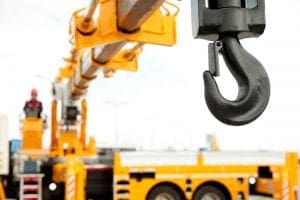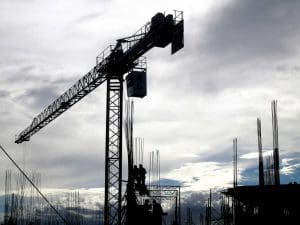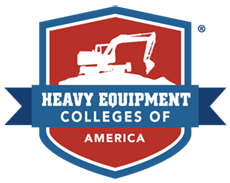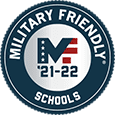Among the most useful pieces of equipment found in construction projects are mobile cranes. If the job requires large, heavy materials to be hoisted, transported, or moved, you’ll likely use a mobile crane. Mobile cranes are also responsible for the most accidents and fatal injuries of all crane types. Due to its power, size, and capabilities, it’s vital that this type of heavy equipment is used safely. Proper training and education can help reduce accidents and make any worksite safer. Interested in a career as a crane operator? Familiarize yourself with these mobile crane safety tips.
Mobile Crane Operation Safety Tips
1. Understanding the Requirements of the Job
Before any job, you should fully understand the capabilities and limitations of the equipment used. From understanding load capacities to knowing which crane to use, each aspect of the job should be considered. Come up with a plan before each lift, run through safety checklists, and be ready to call off a lift if the conditions are not safe. It’s better to postpone or cancel a lift than risk the lives and safety of the people in or around the crane.
2.Personal Protective Equipment (PPE) Check
Reducing hazards on the worksite is important, but it’s impossible to make cranes 100% safe. Therefore, anyone working on the crane should wear the proper personal protective equipment (PPE). It can help protect you in the event of an accident while working with a crane. Below is basic PPE equipment, but certain situations may require additional equipment.
- Hard Hats
- Eye Protection
- Hand Protection
3. Check for Potential Electric Hazard
One of the most dangerous situations for crane operators is potential electric hazards. For example, let’s say an operator is hoisting material near a power source. If the boom or hoist lines come in contact with a power line, the operator and anyone on the ground may get electrocuted. To reduce this hazard, you should have a pre-job checklist to check for electrical hazards. Identify any power sources to determine what equipment is safe for use.
4. Read Operator Manuals
Even if you are qualified and trained to use a mobile crane, it is helpful to read operator manuals. There may be new or unique controls you’re not familiar with. It’s better to have a full understanding of the machine you are working with before operating it. This includes knowing what safety mechanisms, such as load moment devices, are in place. Here are a few things to check in the operating manual.
- Controls
- Load capacity
- Safety mechanism(s)
- Counterweights & stabilizers

Crane Certification FAQs
Crane operation is a growing field that just about anyone can join. Are you interested in learning how to operate a crane? Do you want

Crane Safety – Tips for Safe Lifting
If you’re going to be operating a crane lift, chances are that you could use all the safety knowledge you can manage to get your

10 Quick Tips for Safe Crane Lifts
Like all heavy equipment, cranes can pose a safety threat when not used properly. Crane operators must take the proper precautions necessary to ensure equipment
5. Select the Right Crane for the Job
Safe crane operation begins with selecting the right one for the job. It may seem like one of the most obvious mobile crane safety tips, but mistakes still happen from time to time. To determine what crane should be used for a job, consider the worksite. There are many varieties of mobile cranes to choose from, below are examples of ones to use on specific worksites.
- Crawler crane: Excellent in soft terrain due to track use as opposed to rubber wheels.
- Rough-terrain crane: Can handle rough terrain but cannot be used on public roads.
- All-terrain crane: Versatile, travels well in all types of terrain.
- Carry deck crane: Highly mobile and features easy rotation and setup. Not for rough terrain.
6. Rig Properly and Use a Lift Plan
Good planning leads to safe mobile crane use. All aspects of the lift should be planned out, even if the lift is not critical. Knowing the weight of the load, the crane’s capacity, and determining where it needs to be should all be fully considered beforehand. This is especially important during complex or critical lifts.
7. Be Alert for High Wind
Unexpected wind gusts can wreak havoc on a mobile crane mid-lift. High winds can knock a crane over or cause a load to be dropped. To help reduce the chances of wind interfering, check the crane load capacity charts for wind speed notes. Maximum wind speed may vary across manufacturers and crane types. In the event that you cannot locate this information, lifts should be postponed if the wind is in the range of 15-20 mph. If wind speeds stay above 20 mph, the lift should be canceled or de-rated. In the event of inclement weather approaching, all operators should cease.
8. Avoid Two-Blocking
Two-way blocking can cause serious damage to a crane. It occurs when the load block or auxiliary ball comes in contact with the crane’s boom nose, boom extension, or auxiliary nose. The operator and spotters should know where the crane parts are at any given moment. Know where the load block and/or auxiliary ball is in relation to the boom and/or boom extension to prevent an accident.
9. Follow OSHA Guidelines
The Occupational Safety and Health Administration (OSHA) requires that only trained and certified personnel can operate cranes. Make sure to adhere to and follow any OSHA mobile crane safety tips and regulations. Get the right education and crane operation training. Not only does it improve the safety of the worksite but it helps ensure only qualified workers are operating heavy equipment.
Get Trained & Certified With Programs at HEC
Have these mobile crane safety tips made you interested in a career in the heavy equipment industry? HEC programs are taught by expert instructors who can get you trained certified in as little as three weeks. With six locations scattered throughout the country, you’ll be able to find a campus near you. Programs vary by location. Are you a veteran? We have campuses specifically designated to help former service members make a smooth transition to a rewarding civilian career. Check out our programs and locations pages for more details.




